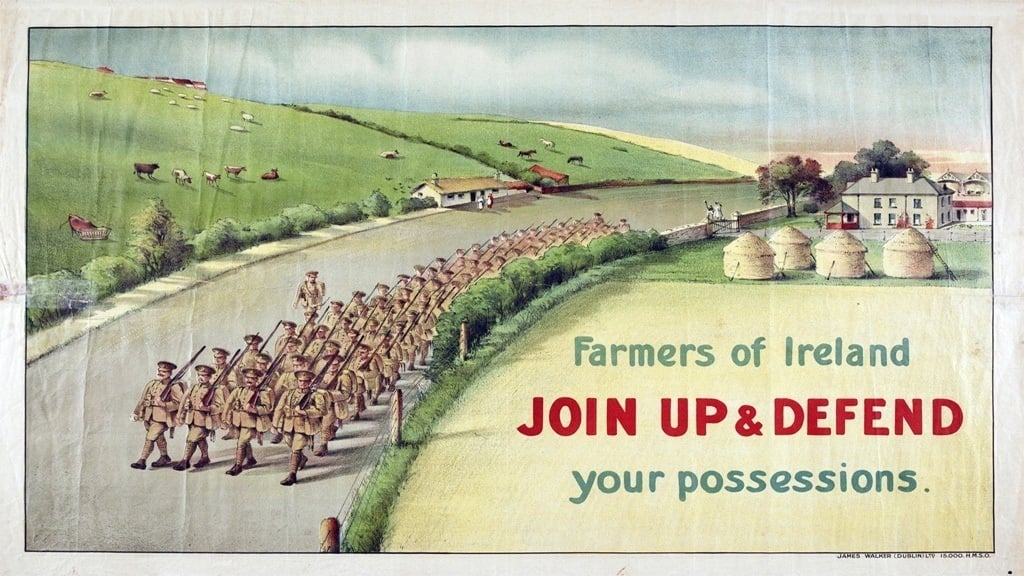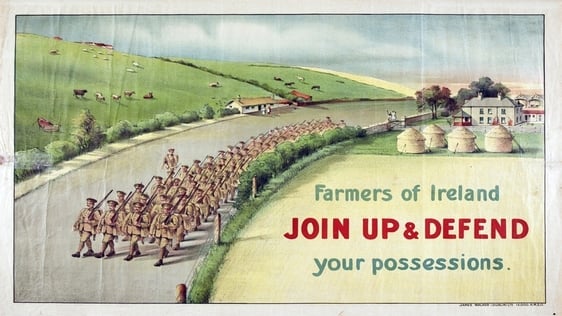01: Ireland and the Great War
An exploration of the silhouetted history of Ireland and the Great War with first-hand witness accounts.
In some respects the amnesia which once characterised Irish memory of the Great War has been bookended by two plays, O'Casey's "The Silver Tassie" and "Observe the Sons of Ulster Marching Towards the Somme" by Frank McGuinness. The former, inter alia, highlighted the inconvenient truth of working class Irish participation in World War 1. The rapidly developing nationalist narrative of the late 1920s did not permit of any such recognition, hence the rejection of the play by Yeats and the Abbey Theatre. The play ran counter to the nation's foundation mythology. It acknowledged a phenomenon whose memory was required to be quietly erased from the Irish collective unconscious. So successful was this process that, a generation later we didn't even know that we didn't know. "We were never told" was the mantra of Frank McGuinness, when he came to write his drama about the slaughter of the men of the 36th Ulster Division on 1 July 1916 on the Somme. The play (premiered by a very different Abbey to the one which had rejected the Tassie) contributed enormously to the process of re-integrating Great War memory into the Irish psyche.
In some respects, this collection of RTÉ archive material is a microcosm of that Irish psyche. RTÉ (in the shape of 2RN) dates from the year prior to the Silver Tassie controversy. Its archive reflects Irish preoccupations. Its omissions point towards our blind spots. On the debit side is the fact that, as a repository of oral history the RTÉ catalogue includes barely thirty first-hand Irish witnesses of the First World War. On the merit side is the fact that it includes all of thirty first-hand witnesses of the Great War in a time of calculated and culpable amnesia.
Bronze and silver stars go to the likes of Jim Fahy, Cathal O'Shannon and Joe Little for their efforts to explore the silhouetted history of Ireland and the Great War. The gold medal goes to radio producer Kieran Sheedy who interviewed more than twenty veterans in his compilation of "The Irish Brigades in the First World War". His field tapes constitute more than half of the mechanically recorded oral history of the period. For a writer of two books on the subject, they were an invaluable resource, just as they are when reproduced on this website.
There are a couple of noteworthy and pleasant revelations in this collection. One is former Northern Correspondent Jim Dougal's news report in 1976 on the return of octogenarian former members of the 36th Ulster Division to the Somme. But the single most beguiling and unexpected surprise was Peter Kennerley's 1966 TV documentary "And in the Morning". Here septuagenarian southerners relive and remember their Great War experiences. What is almost astonishing about the programme is the date of its production. As a child in the Ireland of 1966 I, and most others, were focused on an entirely different 50th anniversary celebration that year. Thanks to the work of the likes of Paddy Harte, Glen Barr, Kevin Myers, Tom Hartley and Tom Burke of the Royal Dublin Fusiliers Association (and numerous others), there is an excellent chance that the 100th anniversaries of the Easter Rising and the carnage of the Somme will both be appropriately and prominently commemorated in 2016.
Myles Dungan
Image courtesy of the National Library of Ireland.











